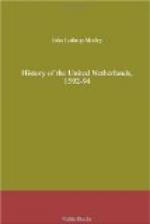The Queen of England was, as might be supposed, beside herself with indignation, and, in consequence of the great apostasy, and of her chronic dissatisfaction with the manner in which her contingent of troops had been handled in France, she determined to withdraw every English soldier from the support of Henry’s cause. The unfortunate French ambassador in London was at his wits’ ends. He vowed that he could not sleep of nights, and that the gout and the cholic, to which he was always a martyr, were nothing to the anguish which had now come upon his soul and brain, such as he had never suffered since the bloody day of St. Bartholomew.
“Ah, my God!” said he to Burghley, “is it possible that her just choler has so suddenly passed over the great glory which she has acquired by so many benefits and liberalities?” But he persuaded himself that her majesty would after all not persist in her fell resolution. To do so, he vowed, would only be boiling milk for the French papists, who would be sure to make the most of the occasion in order to precipitate the king into the, abyss, to the border of which they had already brought him. He so dreaded the ire of the queen that he protested he was trembling all over merely to see the pen of his secretary wagging as he dictated his despatches. Nevertheless it was his terrible duty to face her in her wrath, and he implored the lord treasurer to accompany him and to shield him at the approaching interview. “Protect me,” he cried, “by your wisdom from the ire of this great princess; for by the living God, when I see her enraged against any person whatever I wish myself in Calcutta, fearing her anger like death itself.”
When all was over, Henry sent De Morlans as special envoy to communicate the issue to the Governments of England and of Holland. But the queen, although no longer so violent, was less phlegmatic than the States-General, and refused to be comforted. She subsequently receded, however, from her determination to withdraw her troops from France.
“Ah! what grief; ah! what regrets; ah! what groans, have I felt in my soul,” she wrote, “at the sound of the news brought to me by Morlans! My God! Is it possible that any wordly respect can efface the terror of Divine wrath? Can we by reason even expect a good sequel to such iniquitous acts? He who has maintained and preserved you by His mercy, can you imagine that he permits you to walk alone in your utmost need? ’Tis bad to do evil that good may come of it. Meantime I shall not cease to put you in the first rank of my devotions, in order that the hands of Esau may not spoil the blessings of Jacob. As to your promises to me of friendship and fidelity, I confess to have dearly deserved them, nor do I repent, provided you do not change your Father—otherwise I shall be your bastard sister by the father’s side—for I shall ever love a natural better than an adopted one. I desire that God may guide you in a straight road and a better path. Your most sincere sister in the old fashion. As to the new, I have nothing to do with it. Elizabeth R.”




